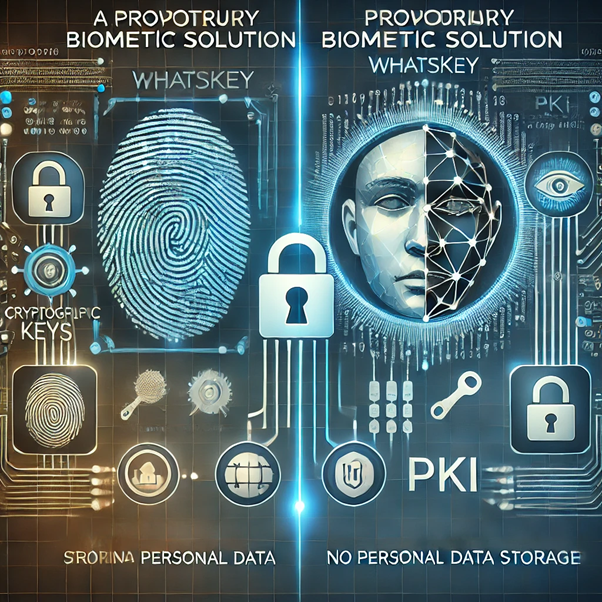As digital security challenges escalate, safeguarding identities and securing sensitive information is more crucial than ever. Two prominent approaches – proprietary biometric solutions and Public Key Infrastructure (PKI)-based systems – offer different benefits. However, understanding their key differences is essential for businesses focused on privacy, security, and scalability.
Biometric solutions authenticate users through biological markers such as fingerprints or facial scans. While convenient for devices like smartphones, they come with significant risks. The storage and comparison of biometric data – whether locally or on centralised servers – create a security vulnerability. Once compromised, biometric data is permanent and cannot be reset, leading to long-term privacy concerns. This inability to revoke or replace biometric traits represents a serious security challenge.
On the other hand, WhatsKey’s PKI-based solution takes a fundamentally different approach. PKI utilises cryptographic keys to authenticate users, eliminating the need to store sensitive biometric data. Each user receives a public and private key, which can be managed, revoked, or replaced if compromised. This makes PKI more flexible and resistant to security breaches. WhatsKey also delivers advanced encryption that is post-quantum resistant, addressing both present and future security threats.
A major advantage of PKI (Public Key Infrastructure) is privacy. Unlike traditional approaches, WhatsKey’s PKI-based solution does not necessitate storing personal physical traits, thereby eliminating the substantial risk of data misuse or theft.
While WhatsKey is currently developing a groundbreaking technology that will eliminate the requirement to compare biometric features during the authentication process, its existing biometric authentication already sets a high standard. Our solution involves storing biometric data exclusively on the user’s private mobile device, significantly reducing the risk of sensitive data being spread or compromised.
In a time of tightening regulations such as GDPR and CCPA, PKI’s compliance with these privacy standards provides businesses with a reliable, future-proof solution for securing sensitive data.
Biometric solutions also fall short in scalability. They require specialised hardware like fingerprint scanners or facial recognition cameras, which limit their scalability in purely digital environments. WhatsKey’s PKI-based solution, however, offers seamless scalability, easily deployable across diverse platforms without the need for specialised devices. This makes PKI ideal for businesses adopting cloud-based infrastructures or expanding their digital footprint.
When it comes to security, WhatsKey’s PKI-based solution stands out. Biometric systems are susceptible to spoofing, replay attacks, and theft, whereas PKI’s cryptographic approach offers a much stronger defence. Compromised keys can be revoked and reissued, providing long-term sustainability and security.
As businesses move toward cloud environments, remote work, and face the upcoming rise of quantum computing, the scalability, security, and privacy of WhatsKey’s PKI-based solution make it indispensable. PKI not only meets today’s security needs but also prepares businesses to tackle future threats.
It’s essential for organisations to reassess their authentication strategies and ensure they’re equipped to face the evolving cyber risks of tomorrow.






